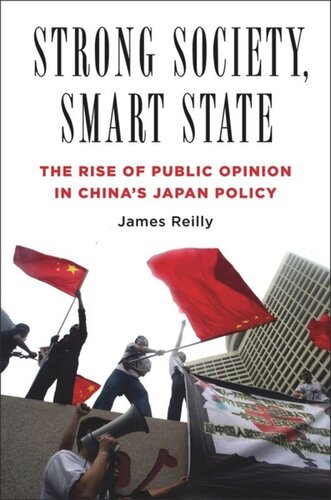

Most ebook files are in PDF format, so you can easily read them using various software such as Foxit Reader or directly on the Google Chrome browser.
Some ebook files are released by publishers in other formats such as .awz, .mobi, .epub, .fb2, etc. You may need to install specific software to read these formats on mobile/PC, such as Calibre.
Please read the tutorial at this link: https://ebookbell.com/faq
We offer FREE conversion to the popular formats you request; however, this may take some time. Therefore, right after payment, please email us, and we will try to provide the service as quickly as possible.
For some exceptional file formats or broken links (if any), please refrain from opening any disputes. Instead, email us first, and we will try to assist within a maximum of 6 hours.
EbookBell Team

5.0
108 reviewsThe rise and influence of public opinion on Chinese foreign policy reveals a remarkable evolution in authoritarian responses to social turmoil. James Reilly shows how Chinese leaders have responded to popular demands for political participation with a sophisticated strategy of tolerance, responsiveness, persuasion, and repression—a successful approach that helps explain how and why the Communist Party continues to rule China.
Through a detailed examination of China's relations with Japan from 1980 to 2010, Reilly reveals the populist origins of a wave of anti-Japanese public mobilization that swept across China in the early 2000s. Popular protests, sensationalist media content, and emotional public opinion combined to impede diplomatic negotiations, interrupt economic cooperation, spur belligerent rhetoric, and reshape public debates. Facing a mounting domestic and diplomatic crisis, Chinese leaders responded with a remarkable reversal, curtailing protests and cooling public anger toward Japan.
Far from being a fragile state overwhelmed by popular nationalism, market forces, or information technology, China has emerged as a robust and flexible regime that has adapted to its new environment with remarkable speed and effectiveness. Reilly's study of public opinion's influence on foreign policy extends beyond democratic states. It reveals how persuasion and responsiveness sustain Communist Party rule in China and develops a method for examining similar dynamics in different authoritarian regimes. He draws upon public opinion surveys, interviews with Chinese activists, quantitative media analysis, and internal government documents to support his findings, joining theories in international relations, social movements, and public opinion.